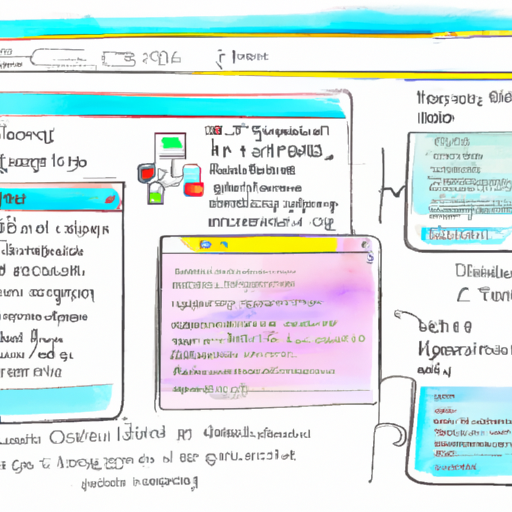This section discusses the impact of DevOps on talent acquisition and the need for organizations to evaluate their practices.
It discusses key metrics for evaluating effectiveness, the importance of attracting and retaining top professionals, factors to consider in talent development, andbest practices for talent management in DevOps.
In today’s competitive and fast-paced business.As organizations strive to streamline their software development and deployment processes, the needto evaluate the effectiveness of DevOps in talent recruitment and retention becomes crucial.
This article aims to provide a comprehensive guide on how to evaluate the impact of DevOps on talent acquisition and retention.
Key parameters that evaluate the effectiveness of DevOps, strategies for attracting and retaining top professionalsDevOps, Assessing DevOps Implementation Success in Talent Development, and Best Practices for Employers in Assessing and Improving DevOps-Related Talent Management By understanding the importance of DevOps assessment in talent management, organizations can optimize their recruitment and retention efforts and ensure the success of their DevOps initiatives.
-
- 1.Evaluating the impact of DevOps.on talent acquisition A comprehensive guide
-
- 2.Key values for evaluating the effectiveness of DevOps in recruitment and retentiontalent
-
- 3.Strategies for attracting and retaining top DevOps professionals in your organization
-
- 4.Evaluating the success of DevOps implementation in talent development and retention
-
- 5.Best Practices for Employers in Assessing and Improving DevOps-Related Talent Management
1. Evaluating the Impact of DevOps on Procurementof Talent A Comprehensive Guide
DevOps has emerged as a game changer in the software development industry, revolutionizing the way organizationsbuild, test, and deploy software.With its focus on collaboration, automation, and continuous integration and delivery, DevOps has become an essential practice for companies striving to remain competitive in the digital age.
As a result, demand for skilled DevOps professionals has skyrocketed, prompting organizations to evaluate their DevOps practices when recruiting.and retaining talent.
1.Identify the skills and expertise needed to effectively evaluate DevOps intalent acquisition, organizations must have a clear understanding of the skills and expertise required to successfully implement DevOps.
DevOps professionals are expected to have a diverse set of skills, including knowledge of programming languages, infrastructure management, automation tools, andcloud technologies.
By identifying the specific skills and expertise required for DevOps roles within the organization, recruiters can ensure they are targeting the right candidates
2. Key Values for Assessing DevOps Effectiveness intalent recruitment and retention
When it comes to evaluating the effectiveness of DevOps in recruiting and retaining talent, there are several key metrics that can provide valuable insights.
These metrics not only help measure the success of the overall DevOps strategy,but also provides a way to measure its impact on talent acquisition and retention.
1.Time to fill vacancies This value measures the time required to fill open positions within the DevOps team.High time to fill vacancies may indicate challenges in attracting and hiring the right talent. It could be a sign of a lack of awareness of the organization’s DevOps practices or difficulty finding candidates with the required skill set.
2.Offer Acceptance Rate This metric measures the percentage of offers extended to candidates that are accepted.A low offer acceptance rate can be a red flag, suggesting that candidates may be receiving more attractive offers from competitors or that there are issues with the organization’s compensation or benefits
3. Strategies for Attracting and Retaining Top DevOps Professionals in Your Organization
In today’s highly competitive job market, attracting and retaining top DevOps professionals is crucial for organizations striving to stay ahead in thedigital.Creating an environment where developers and operations teams work seamlessly together helps attract people who are passionate about DevOps principles and eager to contribute to a collaborative work culture.
Provide opportunities for continuous learning andprofessional development. DevOps professionals are usually highly skilled and constantly seek opportunities to improve their knowledge
4. Evaluating DevOps Implementation Success in Talent Development and Retention
Evaluating the success of DevOps implementation in talent development and retention is essential for organizations to understand the effectiveness of their strategies and make informed decisions.Conduct regular surveys or gather feedback fromto team members to assess their experience with DevOps practices.
Do they find value in the collaborative work environment? Are they able to develop new skills and grow professionally?High employee satisfaction suggests that DevOps contributes positively to talent development and retention.
Skill Development DevOps promotes a culture of continuous learning and skill development.Assess if implementing DevOps practices has led employees to acquire new skills.
Are they able to work with a wider range of technologies and tools? Have they acquired cross-functional knowledge? Assessing skills development can help determine the effectiveness of DevOps in attracting and retaining talent
5. Best Practices for Employers in Assessing and Improving DevOps Talent Management
When it comes to assessing and improving DevOps talent management, employers canbenefit from implementing best practices that ensure they attract, recruit, and retain the right professionals. Here are five key practices to consider
1. Clearly define job roles and expectations To effectively evaluateDevOps talent, employers must have a clear understanding of the roles and responsibilities associated with the position. By defining the roles and expectations of the position, employers can effectively communicate their requirements during the recruitment process and ensure they are attracting candidates with the right skills and experience.
2.Implementing Technical Assessments Technical assessments are a crucial component of DevOps talent assessment. These assessments may include coding challenges, system design exercises, or troubleshooting scenarios relevant to the DevOps role.By assessing technical skills, employers can assess a candidate’s competencies and problem-solving skills, ensuring they are able to meet the job requirements.
3.Assess Cultural Fit In addition to technical skills, cultural fit plays a rolean important role in evaluating and retaining DevOps
In conclusion, evaluating and retaining talent in the context of DevOps is crucial for organizations that want to remain competitive in today’s fast-paced technology landscape.
This article provided a comprehensive guide toassessing the impact of DevOps on talent acquisition, identifying key metrics for evaluating the effectiveness of DevOps in talent recruitment and retention, outlining strategies for attracting and retaining top DevOps professionals, evaluating the success of DevOps implementation in talent development, and preserving and sharing best practices for employersin evaluating and improving DevOps-related talent management.
By implementing these strategies and metrics, organizations can ensure that they not only attract top DevOps talent, but also retain them for long-term success. Ultimately, a DevOps teamstrong can drive innovation, agility and efficiency, leading to increased business success in today’s digital world.
……






